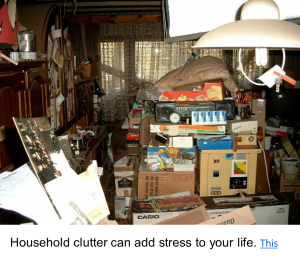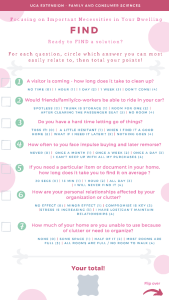
Barbara Worley, FACS Agent, UGA Extension Forsyth County
Clutter is a word that is defined differently for every person. To some, having many items surrounding them in their home might make them feel secure. To others, that could cause frustration and a need to have fewer things in their personal space. Tendencies toward acquiring and keeping possessions is not the same for everyone, and this has led our society to the development of various methods to reduce clutter.

Why do we have clutter?
There are various reasons why some people are more prone to clutter than others. Sometimes lack of time due to poor time management or hectic schedules results in items such as clothes or mail piling up. Not having a system for organizing items makes things messy. Clutter can also be our social or cultural norm. Some generations who lived through historic periods (i.e. The Great Depression) may hesitate to throw away anything that can be used again. Other people feel like they must buy excessively in order to make sure they are always prepared. Additionally, one’s mental health may lead to clutter. A person may find emotional attachments to many of their items and feel the need to keep them, especially if the item belonged to a now deceased loved one.
Benefits of reducing clutter
When things are cluttered, it’s often harder to find things we need at a moment’s notice, which can lead to stress. Reducing clutter can create a sense of accomplishment. Reducing stress can also improve our relationships. When our homes are not cluttered, we’re more likely to invite friends and family over or offer our home as the gathering place for Friday night potlucks. Reducing clutter has a positive impact on our mental health as well, resulting in a sense of calmness and clearer thinking. Also, reducing clutter makes your home safer by reducing tripping hazards.
Barriers to reducing clutter
The reasons people have clutter are vast. Some find the task of organizing overwhelming, while others are attached to memories of objects. Auto-shipments of products and problems with time management can also be a hindrance to reducing clutter.
How to reduce clutter and maintain balance in your life
Everyone has a different idea of how much clutter is manageable. Determining a manageable level of clutter to fit your lifestyle is as important as finding a method of organization. What’s tolerable to one person may be overwhelming to someone else. Figure out what is your motivation to declutter your home. Your primary goal may be to make your home safer and healthier or to reduce allergy and asthma triggers. You may want to redecorate your home. Or, you might find decluttering a way to make money by selling items you don’t need.